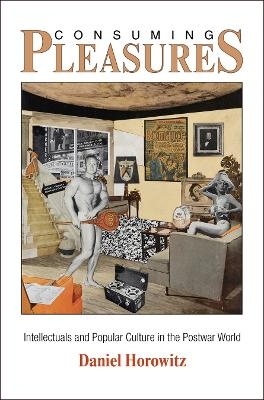
Consuming Pleasures
Intellectuals and Popular Culture in the Postwar World
Seiten
2012
University of Pennsylvania Press (Verlag)
978-0-8122-4395-6 (ISBN)
University of Pennsylvania Press (Verlag)
978-0-8122-4395-6 (ISBN)
Between 1950 and 1972, American and European writers came to envision consumer culture in fresh, provocative ways. Across national boundaries, they shifted attention from condemnation to critical appreciation, critiqued cultural hierarchies and moralistic approaches, and explored the symbolic processes by which individuals and groups communicate.
How is it that American intellectuals, who had for 150 years worried about the deleterious effects of affluence, more recently began to emphasize pleasure, playfulness, and symbolic exchange as the essence of a vibrant consumer culture? The New York intellectuals of the 1930s rejected any serious or analytical discussion, let alone appreciation, of popular culture, which they viewed as morally questionable. Beginning in the 1950s, however, new perspectives emerged outside and within the United States that challenged this dominant thinking. Consuming Pleasures reveals how a group of writers shifted attention from condemnation to critical appreciation, critiqued cultural hierarchies and moralistic approaches, and explored the symbolic processes by which individuals and groups communicate.
Historian Daniel Horowitz traces the emergence of these new perspectives through a series of intellectual biographies. With writers and readers from the United States at the center, the story begins in Western Europe in the early 1950s and ends in the early 1970s, when American intellectuals increasingly appreciated the rich inventiveness of popular culture. Drawing on sources both familiar and newly discovered, this transnational intellectual history plays familiar works off each other in fresh ways. Among those whose work is featured are Jürgen Habermas, Roland Barthes, Umberto Eco, Walter Benjamin, C. L. R. James, David Riesman and Marshall McLuhan, Richard Hoggart, members of London's Independent Group, Stuart Hall, Paddy Whannel, Tom Wolfe, Herbert Gans, Susan Sontag, Reyner Banham, and Robert Venturi and Denise Scott Brown.
How is it that American intellectuals, who had for 150 years worried about the deleterious effects of affluence, more recently began to emphasize pleasure, playfulness, and symbolic exchange as the essence of a vibrant consumer culture? The New York intellectuals of the 1930s rejected any serious or analytical discussion, let alone appreciation, of popular culture, which they viewed as morally questionable. Beginning in the 1950s, however, new perspectives emerged outside and within the United States that challenged this dominant thinking. Consuming Pleasures reveals how a group of writers shifted attention from condemnation to critical appreciation, critiqued cultural hierarchies and moralistic approaches, and explored the symbolic processes by which individuals and groups communicate.
Historian Daniel Horowitz traces the emergence of these new perspectives through a series of intellectual biographies. With writers and readers from the United States at the center, the story begins in Western Europe in the early 1950s and ends in the early 1970s, when American intellectuals increasingly appreciated the rich inventiveness of popular culture. Drawing on sources both familiar and newly discovered, this transnational intellectual history plays familiar works off each other in fresh ways. Among those whose work is featured are Jürgen Habermas, Roland Barthes, Umberto Eco, Walter Benjamin, C. L. R. James, David Riesman and Marshall McLuhan, Richard Hoggart, members of London's Independent Group, Stuart Hall, Paddy Whannel, Tom Wolfe, Herbert Gans, Susan Sontag, Reyner Banham, and Robert Venturi and Denise Scott Brown.
Daniel Horowitz is Mary Huggins Gamble Professor of American Studies at Smith College.
Preface
Introduction: Understanding Consumer Culture in the Post-World War II World
Chapter 1. For and Against the American Grain
Chapter 2. Lost in Translation
Chapter 3. Crossing Borders
Chapter 4. Reluctant Fascination
Chapter 5. Literary Ethnography of Working-Class Life
Interlude
Chapter 6. Pop Art from Britain to America
Chapter 7. From Workers and Literature to Youth and Popular Culture
Chapter 8. Class and Consumption
Chapter 9. Sexuality and a New Sensibility
Chapter 10. Learning from Consumer Culture
Conclusion: The World of Pleasure and Symbolic Exchange
List of Abbreviations
Notes
Index
Acknowledgments
| Erscheint lt. Verlag | 2.4.2012 |
|---|---|
| Reihe/Serie | The Arts and Intellectual Life in Modern America |
| Zusatzinfo | 15 illus. |
| Verlagsort | Pennsylvania |
| Sprache | englisch |
| Maße | 155 x 235 mm |
| Themenwelt | Geschichte ► Allgemeine Geschichte ► Neuzeit (bis 1918) |
| Sozialwissenschaften ► Soziologie | |
| ISBN-10 | 0-8122-4395-1 / 0812243951 |
| ISBN-13 | 978-0-8122-4395-6 / 9780812243956 |
| Zustand | Neuware |
| Haben Sie eine Frage zum Produkt? |
Mehr entdecken
aus dem Bereich
aus dem Bereich
Giordano Bruno - ein ketzerisches Leben
Buch | Hardcover (2024)
C.H.Beck (Verlag)
29,90 €
das dramatische 16. Jahrhundert
Buch | Hardcover (2024)
Rowohlt Berlin (Verlag)
34,00 €


